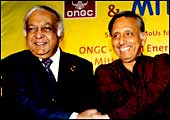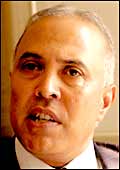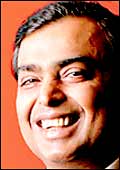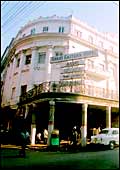|
HEADLINER
P.K. Ruia
KOLKATA MAY BE
an unlikely place to give rise to a takeover artiste. But if the
city-based industrialist Pawan Kumar Ruia has it his way, then
the unthinkable may just happen. Ruia, 47, who shot to fame with
his acquisition of state-run engineering giant Jessop & Co.
in 2003, is said to be in the lead for buying the late Manu Chhabria's
tyre companies, comprising Dunlop, Falcon Tyres and India Tyre.
When BT went to press, Ruia was in Singapore trying to close the
deal. It is not known how much the trader-turned-takeover-artiste
has bid for the companies, but market sources put the figure between
Rs 250 crore and Rs 300 crore. Ruia, a chartered accountant by
education, faces stiff competition from a host of rival bidders,
including Swraj Paul's Caparo Group, JK Tyre, Hero Group and Metro
Tyres. Sources close to Ruia say that his group will shell out
between Rs 350 crore and Rs 400 crore in modernising the companies.
Whenever the deal is signed, it will mark the exit of the Dubai-based
Chhabria family from India Inc.
Ritwik Mukherjee
Giving Simputer A New Lease Of Life
 |
| PicoPeta's Manohar: There's hope yet |
In the four years since it was launched,
the Simputer, a low-cost handheld computer hailed as an answer
to India's digital divide, has sold a bare 4,000 units-there are
more mobile phones sold in India every day. And just when people
were beginning to write off the Simputer, developed by Swami Manohar
of PicoPeta, it has found a new lease on life. Mumbai-based Geodesic
Information Systems has acquired the Bangalore-based hardware
firm for an undisclosed amount. Prashant Mulekar, a Director with
Geodesic, says that the Simputer has been doing below potential.
"We can add the product expertise to the Simputer and take it
forward," he says. It's a moot point if Geodesic will succeed
where PicoPeta failed.
-Kushan Mitra
Ranbaxy's Patent Challenge Woes
Ranbaxy laboratories suffered another setback last
fortnight, when a us Court of Appeals ruled that it could not
continue selling generic version of Pfizer's anti-hypertensive
drug, Accupril. The Gurgaon-based pharma major had appealed against
an injunction delivered by a district court. "Ranbaxy intends
to vigorously challenge infringement, validity and enforceability
of the patent in further proceedings before the district court,"
Ranbaxy's Vice president of Global Intellectual Property, Jay
Deshmukh, said in a release. The company's stock fell on the news.
Earlier, in the middle of October, Ranbaxy had suffered another
reversal when a UK court barred it from launching a generic version
of Pfizer's $12-billion (Rs 54,000-crore)-a-year anti-cholesterol
drug, Lipitor.
NEWSMAKERS
Oil's Power-duo
 |
| Raha (L) and Aiyar: The
smiles are for the camera |
India's petroleum
minister Mani Shankar Aiyar and Subir Raha, the Chairman and Managing
Director of the country's most valuable company, a public sector
enterprise to boot, Oil and Natural Gas Corporation, have been
sparring for some time. The bone of contention has been different
things at different times; the origin of the spat, however, and
its continuance has to do with control. It could, in part, also
arise from Aiyar's desire to be seen as India's Mr Oil, something
that has been scotched at times by the media-savvy Raha, who seems
to nurture similar ambitions. In the past fortnight, however,
the fight has gotten shriller (at least from one side). Aiyar
has sort of upped the ante by reportedly asking the apex body
in charge of public sector firms to remove ONGC from its list
of navratnas (literally, nine gems). If that happens, ONGC will
lose more than just a title; public sector firms that are labelled
navratnas get to practice a lot more autonomy (near-total; well,
almost) than others (who get no autonomy at all). The ostensible
reason for this is ONGC failing to meet production targets specified
by Aiyar's ministry (this dates back to April 2005). Aiyar has
also taken his campaign to the media, praising Raha as a competent
manager to a leading financial daily while, in the same breath,
hinting at serious operational and corporate governance issues
at ONGC. There's no telling how the tug of war will play out,
but in its 50th year of existence, this is publicity of the sort
ONGC could have done without.
NUMBERS
OF NOTE
14%:
The number of workers worldwide who are highly engaged-defined
as willing and able to help a company succeed-according to Towers
Perrin, a human resources consultancy. In India, just 7 per cent
of workers are "highly engaged", one-third the number
in the US. Only Japan ranks lower (2 per cent)
12 million:
The number of pages the documents with the The Independent
Inquiry Committee into the Oil-for-Food Programme (Volcker Committee)
run into
$21.7
billion (Rs 97,650 crore): The flow of NRI remittances into
India in 2004, according to a World Bank report. China received
remittances worth $21.3 billion (Rs 95,850 crore) from Non Resident
Chinese
$1.5 billion
(Rs 6,750 crore): Daily trading volume on India's two new
exchanges, the Multi Commodity Exchange and the National Commodity
and Derivatives Exchange
101:
The number of companies that have applied for 300 FM radio
licences in 91 cities
300:
The number of jobs UK bank Lloyds TSB will move to India when
it closes an office of its mortgage provider, Cheltenham &
Gloucester, near Warwick by the end of 2006
 17
million: The number of children working in India, according
to government data. Child rights activists put the figure at 200
million 17
million: The number of children working in India, according
to government data. Child rights activists put the figure at 200
million
20:
The number of Indian companies featuring in Forbes magazine's
list of Best Small Asian Companies. The 20 includes companies
such as Cipla, Asian Paints, Bharat Forge and Satyam Computer
Services
59.54
million: Domestic and international passengers that passed
through Indian airports in 2004-05, compared with 40 million a
year earlier
2.67 million
bpd: India's oil demand in the last quarter, up from 2.52
million bpd in the preceding quarter
0.1
per person: Per-capita air travel (flights per year) in India,
a fraction of the global average of 2
Going,
Going, Gone
Actually, that's
no pun on the state of the state-owned Great Eastern Hotel, once
one of the best hotels in this part of the world. It was spoken
of in the same breath as Singapore's Raffles. Since 1975, and
its acquisition by the state government-the acquisition was driven
by the desire to prevent it from falling into hard times-the hotel
has gone to seed, and its acquisition by Lalit Suri's Bharat Hotels,
may well be for the best. Suri plans to pump in Rs 120 crore to
turn the hotel into a 250-room heritage property. The trade unions
(employees received golden handshakes) are happy; so is the government.
And to think this happy ending was effected in Red bastion, West
Bengal.
-Ritwik Mukherjee
NOTED
 Acquired:
By telecom major Vodafone, the
(enabling) permission of the Indian government to hike its stake
in Bharti Enterprises, the company that owns a 45.9 per cent stake
in Bharti Tele-Ventures (India's largest mobile telephony company),
should both partners agree to do so. Vodafone (CEO Arun Sarin,
above) recently acquired a beneficial 10 per cent stake in Bharti
Tele-Ventures. Acquired:
By telecom major Vodafone, the
(enabling) permission of the Indian government to hike its stake
in Bharti Enterprises, the company that owns a 45.9 per cent stake
in Bharti Tele-Ventures (India's largest mobile telephony company),
should both partners agree to do so. Vodafone (CEO Arun Sarin,
above) recently acquired a beneficial 10 per cent stake in Bharti
Tele-Ventures.
Murdered: Indian
Oil Corporation's Sales Manager, Manjunath Shanmugam, 27, by the
owner of a petrol station in Uttar Pradesh. The retail petrol
and diesel business in parts of Uttar Pradesh is controlled by
the mafia. Over the past few months, Shanmugam, an alumnus of
the Indian Institute of Management, Lucknow had shut down two
petrol stations for selling adulterated fuel.
Ranked: India
as the #1 location in consulting firm AT Kerney's Global Services
Location Index, a listing of companies in terms of their standing
as preferred 'offshoring' destinations for IT and IT enabled services.
China is ranked #2 and the United States #11.
Announced: By
the International Labour Organization, that it is considering
laying down norms (in terms of work conditions) for call centres
and business process outsourcing firms, amidst widespread reports
of people working in 'sweat-shop' conditions in companies engaged
in such businesses. There are fears in some quarters that the
norms, when they are stipulated, could be used by some countries
as a 'barrier' against outsourcing work to companies in countries
such as India.
 Rated:
Reliance Industries (Chairman Mukesh Ambani, left) above Rated:
Reliance Industries (Chairman Mukesh Ambani, left) above
India's sovereign rating, by international rating agency Standard
& Poor's.
It is rare for companies operating in a country to receive a rating
higher
than the sovereign rating. Reliance is the third Indian company
after
software services firm Infosys Technologies and steel major Tata
Steel
to receive this distinction.
The
Mid-tier Search Engine
 |
| Korn/Ferry's Reilly: "India
is short of experience" |
India's still-young
executive search business has suddenly grown up. Segmentation
and differentiation are sure signs of maturity and Korn/Ferry
International's launch of Futurestep, its seven-year-old global
company that headhunts middle managers across sectors, in India
last month is as textbook a case as segmentation gets. Currently,
there are just a few companies that operate in this space; ABC
Consultants and Manpower Services India are two. What makes middle
management recruiting happening is the booming economy and the
fact that there aren't too many middle managers around. "Senior
and middle management talent is short for different reasons across
the world," says Paul Reilly, Chairman & CEO, Korn/Ferry
International. "India is short of experience-(d middle managers),
while Europe and the Americans are short, demographically."
Could Indian middle managers (those of whom are experienced) fill
in vacancies in European and American companies? Well, Futurestep's
Indian operations are to be headed by Asim Handa, a veteran of
the Business Process Outsourcing industry and he knows a thing
or two about that.
-Amanpreet Singh
|







 17
17
 Acquired:
Acquired:
 Rated:
Rated: